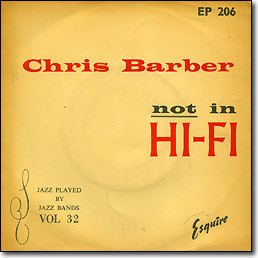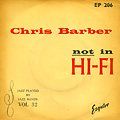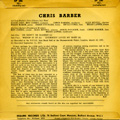 |
|||||||||
7-inch 45 rpm extended play record, recorded in 1951 and released later in the 1950s on Esquire EP 206; Available on CD from Lake Records: The Great Revival, Traditional Jazz 1949-58, Volume 4.
The three tracks on this venerable and fairly rare EP are not the first that Chris Barber recorded (that occurred in 1949 and 1950 when some private acetates were made). Nor were they the first of Chris's recordings to be commercially released (because later records preceded this one into the shops). However, they are the earliest recordings by Chris Barber and his fellow musicians that have ever been generally released to the public, and are therefore of great historical interest. (They are currently still available on two compact discs: Lake Records' The Great Revival, which is shown to the left and linked above, and a more recent double-CD, Just About As Good As It Gets.) From the perspective of today's Big Chris Barber Band, and the fact that the now 78-year-old Chris Barber is still going strong, it's worth noting that the first track on the EP, Oh Didn't He Ramble, was recorded in March 1951, when Chris was not yet 21. At that time the band went under the name of Chris Barber's New Orleans Jazz Band, which temporarily became Chris Barber's Washboard Wonders for the second set: the personnel was more or less the same, while the instrumentation changed (Chris, for example, switched from trombone to bass), as can be seen on the recording details reproduced here:
Another interesting aspect of this music is just how much Chris as an individual player, and his new post-Colyer band as a unit, progressed from the earlier sounds of a little over three years earlier. You can get a good idea of this by comparing the 1951 version of Everybody Loves My Baby with the one subsequently recorded by the 1954-55 Chris Barber's Jazz Band. * A fourth track, Snake Rag, was recorded at the same session as Oh Didn't He Ramble but was published on a different Esquire record. It's included on both of the CDs mentioned in the text. On the rest of this page you can read the original EP sleeve notes, listen to the track excerpts referred to above, and view scans of the record sleeve and labels. Elsewhere in the website you will find a Swedish release of the EP on the Gazell label, several photos of the early Chris Barber bands (The Early Bands, 1949-1952), as well as a slide show. |
|||||||||
The original sleeve notes, by "R.P.": It may, perhaps, be a little early to start talking about the history of British Traditional jazz, but it does seem that our better bands are now forming styles which can be said to sound as distinctive as the older recognized "schools". The Chris Barber band are without doubt among the leaders of this movement away from the more rigid forms of Traditionalism, favouring an increasingly personal and eclectic approach. Whether this will result in a permanent and stable innovation it is still too early to say, but the start has been made and greater things may follow. It is with this in mind that Esquire are issuing two sessions of "early" bands under the leadership of Chris Barber. The first of these was, in fact, recorded at a ball organized by the N.F.J.O. at the Hammersmith Palais and a very lively one too if you remember (if you don't, this track will bear out what I say). Favouring a two-trumpet lead the band gave a spirited version of the old funeral march Oh didn't he ramble, and whilst the recording quality, as often happens with concert recordings, is not of studio standard, it is plain that this is quite representative of what, even then, was a band of distinction. I think that special mention should be made of the powerful bass playing of Brylo Ford who was at that time of veteran standing among musicians and as far as I know is still playing. The second session is by a smaller band than the first, in fact only a two piece front line, missing out one trumpet, trombone and in the rhythm section, piano. The drums are replaced by washboard and Chris himself switches to bass, which, incidentally, he studied at the Guildhall School of Music. The trombone and the double bass go together somehow—Austin Young and John Lindsay, two great New Orleans veterans, being among the famous who have excelled on both. Depleted though they are, the group have a surprisingly full sound and give the two old tunes a fresh and confident treatment. The relaxed and deceptively simple style of the present Barber Band has earned it the leading position among traditional bands in this country today, and yet as long ago as these examples you will recognize that Chris had started working to build a band with these qualities. In short this is a record of rare interest to the traditionally minded. Besides being some of the most vigorous jazz ever recorded by the Chris Barber Band it is some of the earliest. So, if you want your collection to start at the beginning or if you just want it to contain the best you won't go far wrong with this one. |
|||||||||
| Music: Oh Didn't He Ramble || Everybody Loves My Baby || Everybody Loves My Baby (1955 version) | |||||||||
|
|||||||||
Previous cover || Next cover || Covers page |
|||||||||






